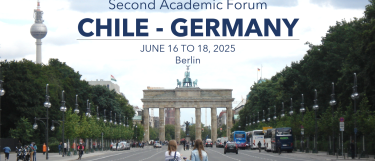
2nd Chile-Germany Academic Forum
BERLIN, FROM June 16th to 18th, 2025
Established in 2023, this academic initiative aims to strengthen existing ties and forge new collaborations between Chilean and German universities. The primary goal of the Forum is to collaboratively address global challenges, in particular, threats to the environment in an unpredictable and multipolar world. Participants will approach these challenges by fostering collaboration between Chilean and German institutions, and leveraging interdisciplinary knowledge to develop sustainable science-based solutions.
Registration date extended: apply now!
The next forum will be held in Berlin, from June 16 to 18, 2025, hosted by Technische Universität Berlin. In this version, participants will engage in either of the following working groups:
1. Energy, Raw Materials and Resources for the Green Transition:
Scientific coordination: Prof. Dr.-Ing. Roland Dittmeyer
Organizational coordination: Karlsruher Institute of Technology
Considering the urgent need to address climate change, this working group will focus on issues related to the transition from fossil fuels to renewable energy sources. Both countries are committed to this transition, with Chile having a significant renewable energy potential, and Germany offering technological expertise, with the development of green hydrogen as a shared interest. However, there are several challenges on grid infrastructure, cost management, and the integration of new technologies. Social and territorial consequences, public acceptance, job impacts, and land use planning are also a significant concern. Market and political challenges also must be assessed as well to implement effective regulatory frameworks. All this offers opportunities for deepening research through Chile-Germany academic cooperation.
2. A World in Movement: Climate Change, Territoriality and Migration:
Scientific coordination: Prof. Dr. Markus Kotzur
Organizational coordination: Universität Hamburg
This working group seeks to critically explore the dynamic interplay between climate change, territoriality, and human migration. Climate-induced displacement—whether internal or transnational—presents complex and uncertain outcomes for affected communities, demanding a multi-disciplinary approach. The working group will therefore address climate-induced migration and the underlying government policies, governance structures and international legal frameworks but also cultural implications and sensitivities as well as dimensions of justice in its international and local dimensions. Participants are invited to contribute insights from a range of disciplines, including environmental science, law, policy, sociology, human geography, history, area studies, and more to deepen the collective understanding of this critical global issue.
3. Livable Cities: Resilient Architecture and Urban Development:
Scientific coordination: Prof. Dr. Jacob van Rijs
Organizational coordination: Technische Universität Berlin
This working group will discuss approaches to help cities become livable and resilient in the face of environmental, social, and economic challenges. Discussions will focus on sustainable urban planning, resilient architectural design, and the integration of green technologies to enhance urban living, ensuring that our cities can thrive now and in the future.
4. Global Health and New Developments in Biotechnologies:
Scientific coordination: Prof. Dr. Justo Lorenzo Bermejo
Organizational coordination: Universität Heidelberg
The aim of this working group is to explore research opportunities at the interface between global health and new biotechnological developments. In a rapidly changing landscape, the integration of recent advances in molecular epidemiology and data science offers great potential to improve health and reduce health inequalities worldwide. Emerging (bio)technologies and evidence-based health research can provide new answers to the question of better health for all, but they also pose risks if applied without proper safeguards. This working group will promote binational collaboration in the fields of genetic epidemiology and big data analytics, health innovation, and social determinants of health, while addressing research opportunities as well as ethical and data safety concerns.
5. The Frontiers of Sciences, Arts and Humanities: closed for proposals. The accepted applications will be announced soon.
Project Partners
Contact:
- Technische Universität Berlin (Host for 2025)
- Universität Heidelberg
- Universität Hamburg
- Karlsruher Institut für Technologie
- Pontificia Universidad Católica de Chile
- Universidad de Chile
- Universidad de Concepción